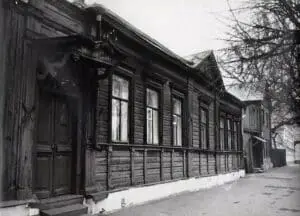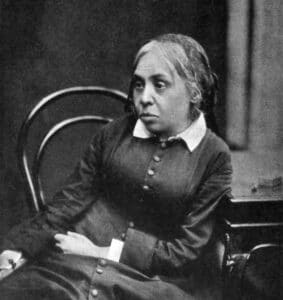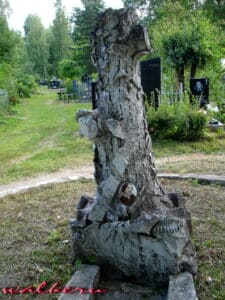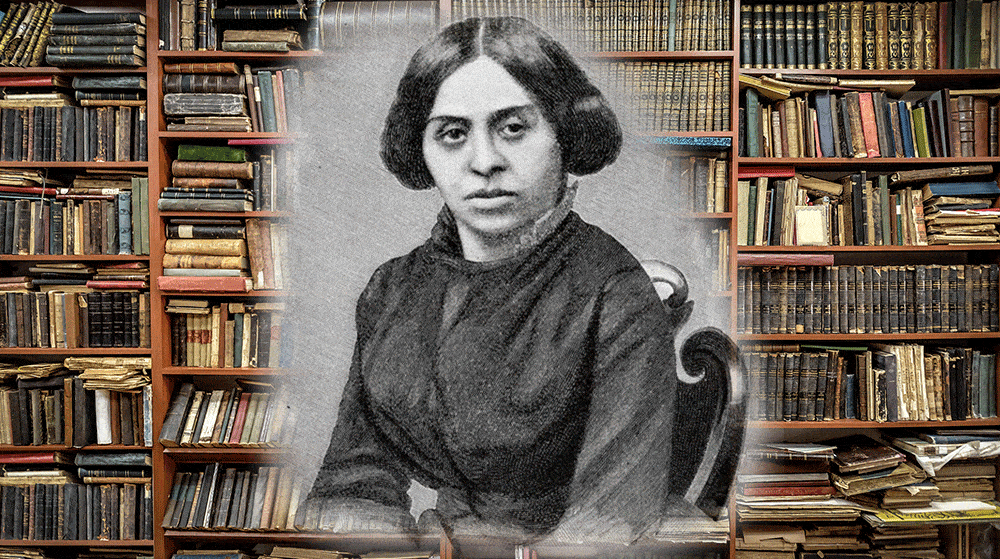Nadezhda Khvoshchinskaya became a prolific and widely popular author in early 19th century Russia. Her most famous novels reflect on the stylistic staples of 19th century Russian literature, focusing on women’s issues and other social problems through the lens of realism. Despite her fame and success, Nadezhda Khvoshchinskaya has largely been forgotten in the study of Russian literature. Recent historical literature societies, like the Pushkin House as well as several efforts within Russia, have made efforts to preserve Khvoshchinskaya’s rightful place as a mammoth of Russian literature and a small band of translators are working to make her more accessible to global readers.
Early Life of Nadezhda Khvoshchinskaya
Nadezhda Khvoshchinskaya was the oldest of four siblings – with two sisters and one brother. Literature and writing were pillars in this house, and all three sisters became published authors in their lifetime. The sisters were nicknamed “the Russian Brontes” for their literary prowess.

Nadezhda Khvoshchinskaya was born into an educated family. Her father, a member of Russia’s old nobility, served as an artillery officer and was a veteran of the War of 1812. After the war, he retired from the military, married Yulia Vikentievna Drobyshevskaya-Rubets, a woman of noble Polish decent, and purchased a small estate with a distillery in the province of Ryazan. In addition, he took a civil service management position in the Tsar’s Department of Horse Breeding. While this should have secured him and his young family a quite comfortable life, he was accused of embezzling funds in 1832 and, although the charges were dropped 12 long years later, he lost nearly everything in his legal struggles. In that time, having lost his estate, he had to move his family into a badly fire-damaged home in the city of Ryazan, the only thing he could then afford.
Nadezhda was just nine years old when her family’s troubles started. Throughout the ordeal, which would last until she was about 21, she served as her father’s secretary, assisting him in researching, writing arguments, letters, and official documents. The family talked openly of the developments and other social issues. A deep knowledge of provincial sociopolitical and economic workings shows through in many of Nadezhda’s later works. She also read widely, counting William Shakespeare, Dante, Friedrich Schiller, and Victor Hugo among her favorite authors. The entire family, deeply interested in literature and the arts, wrote extensively. Nadezhda was the editor of Zvezdochka (meaning “Little Star”), the handwritten literary journal of their household.
Although their family could not afford to send them to a school, Nadezhda Khvoshchinskaya and her sisters still received an excellent education due largely to the nature of their household and due to the tutoring they received from their educated mother. They also still occasionally travelled, usually as guests of wealthier relatives and both Nadezhda and her sister Sofia received some formal education at private school in St. Petersburg thanks to these same wealthy relatives. Thus, all three sisters excelled as writers. Their brother went on to serve as an officer in the military.
Nadezhda began writing to support her family. She would eventually be the main breadwinner for a large extended household after her beloved father’s untimely and sudden death in 1856. That family included not only her sisters and mother, but also five unmarried aunts and her brother’s wife and two sons who came to live with them while he served in the Caucasus. Unfortunately, although she became one of Russia’s most highly paid and widely read authors, with many dependents and herself much more dependent upon her male publishers than other authors, the Khvoshchinskys were able to live well, but did not achieve the same level of wealth as many other popular authors at the time.
Early Career of Nadezhda Khvoshchinskaya
Nadezhda Khvoshchinskaya published her first poem at 18 years old. She wrote hundreds of poems and short stories in the early days of her career, many being published in journals, especially Notes of the Fatherland, a liberal and later radical literary journal, but the majority of Nadezhda’s work was not published. In 1850, when she was 26, she wrote her first novel, Anna Mikhailovna. Like many female writers of her time, she adopted a male pen name to write under so as to be taken more seriously in a society where many considered writing to be “unfeminine.” Thus, she would be known as V. Krestovsky for the rest of her writing career.

In 1852, she travelled to St. Petersburg, where she stayed with wealthy relatives. Much of her early work concerned the feelings of loneliness and displacement that she felt living in the provinces. In St. Petersburg, however, she was warmly welcomed to literary circles that had read her work and encouraged her to produce more. When she returned home, she wrote with redoubled energy. It was at this time that the fees she commanded for her work began to increase as well.
In 1853, she tried her hand and writing an entire novel in verse. Titled A Village Incident, the book centers around family relations and the banality of village life. It received mixed reviews at the time and Nadezhda soon shifted entirely to writing in prose. Today, however, A Village Incident is regarded as one of her more striking works.
By 1859, V. Krestovsky was popular enough that the voluminous works that Nadezhda had written under this name were published as The Compiled Works of V. Krestovky, a great honor for any writer.
Nadezhda wrote one of her most famous novels, The Boarding School Girl in 1861. Incredibly popular upon publication, it focuses on the plight of women in Imperial Russia, with a realist tone that matched the style of popular male authors at the time. Throughout the novel, its heroine, 16-year-old Lelenka, learns about her autonomy and ability to choose the direction of her own life in a powerful coming-of-age story. This was an important narrative at the time, when women’s emancipation was widely discussed, and made waves among Russia’s intellectual class, especially with women and girl readers.
Crisis and Success
Nadezhda’s sister, Sofia Khvoshchinskaya, shared a similar passion and craft for writing and was also a talented painter. The two were the most successful writers of their family, with Sofia publishing prolifically under the pseudenom Ivan Veseniev. The two shared a unique bond, often seeking each other out for ideas and advice throughout their writing process and supporting each other in their crafts and lives.
In 1865, Sofia contracted abdominal tuberculosis and died later that year. Nadezhda fell into a deep depression and she compulsively attempted to fulfill everything her sister had wished for on her deathbed. Among these wishes was that Nadezhda marry the young doctor who had treated her and fallen passionately in love with Nadezhda during the time he spent with the family.
The doctor, I. Zayonchkovsky, had previously served time in prison for his political activism. There, he had contracted tuberculosis and spent the rest of his life chronically ill himself, which also exacerbated his tendency to be zealous and demanding. In 1868, two years into a marriage that left Nadezhda emotionally and physically exhausted, Zayonchkovsky was sent abroad for treatment. Nadezhda remained in Russia. Her husband passed away four years later while still abroad.
In 1869, with some respite after a tumultuous four years, Nadezhda wrote one of her most important pieces, The First Struggle. The novel reflects back on the past decade of life in Russia, which had been revolutionary and transformative. In 1861, Tsar Alexander announced the Emancipation Proclamation, which freed Russia’s millions of estate-bound serfs. The result was a loss of power for many aristocrats, but also an economic revolution which boosted trade and especially agricultural production. Alexander also relaxed the three decades of tight censorship his predecessor had implemented, allowing more socially conscious writers like Nadezhda to express their ideas and tell their stories more freely. The hero of The First Struggle is a man who is confident in this new world and disdainful of the conservative forces that long for Russia to return to its previous state.
She followed this powerful return to the literary stage with what many consider to be her most important work, Ursa Major, in 1871. The novel tells of a man struggling to leave his wife in favor of a younger, friendlier girl and focuses on issues of women’s liberation, arguing if it could really be achieved via the loving efforts of men. Ursa Major was long in the making. Begun in 1865, around the time of sister’s illness, it was then set aside as the author struggled with depression and her own troubled marriage. She picked the work up anew in 1868, around the time her husband was sent away, but only with the considerable support and help of her youngest sister, Praskovya (who wrote under the pseudonym S. Zimarov). Once finally published, the book was widely read and debated, becoming a true social phenomenon and contributing greatly to public discourse.
Nadezhda remained a prolific author throughout the 1870s, publishing, for instance, The Meeting, and became Russia’s third highest earning author over that decade. Renowned artist Ivan Kramskoi painted her portrait in 1876 as part of a series commissioned by businessman and philanthropist Pavel Tretyakov to document the most important living cultural figures of the day. In 1884, after her mother died, she was gifted an apartment in St. Petersburg as an honored author of Russia’s Literary Fund. Just a year after moving permanently to St. Petersburg, however, Nadezhda developed heart problems and fell seriously ill.
The Death and Critical Legacy of Nadezhda Khvoshchinskaya

Nadezhda’s final years were devoted mostly to translating French and Italian writers into Russian and writing literary criticism. She still wrote original works as well, publishing Blizzard, a story that warns against turning back social reforms, in 1889, the year she died after her long illness. Her death, at 68 years old, occurred at a dacha in Peterhof. She was laid to rest in that same city.
Nadezhda Khvoshchinskaya led a troubled yet prolific life. Most of her stories focused on what she knew best – provincial life and the familial and societal relations that occurred there. She followed social issues closely and was a steadfast supporter of the reform movements of her day. She was best known for the extreme attention she gave to detail and continuity – even filling notebooks with character timelines and even sketches of the floorplans on the houses they lived in – as well as for the touching emotion with which she wrote of heroes and heroines.
Not all critics received her work warmly. Many accused her of creating too-perfect heroes and heroines who sought an unobtainably too-perfect society. Many also dismissed the arguments made in her stories as being too emotional for issues that required more logic. However, what is undeniable is that she contributed greatly to public discussion of important social issues, documenting one of Russia’s most hopeful periods of social change. She did so with literature that was widely popular at the time and deserving of study and literary enjoyment today, on par with the great authors that Russia is already known for.







